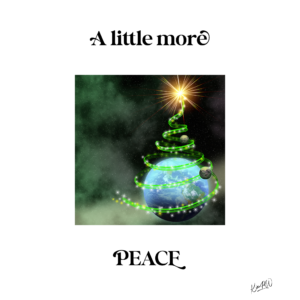A Little More Peace

Let there be peace on earth and let it begin with me… ~ Jill Jackson-Miller and Sy Miller
Peace is a state of tranquility or quiet. It is the absence of conflict, violence, or disturbance. Peace is a valuable commodity that is often taken for granted. However, the benefits of peace are immense and far-reaching.
When individuals experience peace, they reap a number of benefits. These benefits include:
* Improved mental health: Peace can reduce stress and anxiety, leading to improved mental health.
* Better physical health: Peace can also improve physical health by reducing the risk of heart disease, stroke, and other chronic conditions.
* Increased creativity: Peace can foster creativity and innovation.
* Stronger relationships: Peace can promote stronger relationships with family, friends, and colleagues.
* Greater sense of well-being: Overall, peace can lead to a greater sense of well-being and happiness.
Peace also has a number of benefits for communities. These benefits include:
* Reduced crime: Peace can reduce crime rates and make communities safer.
* Improved economic growth: Peace can lead to improved economic growth by creating a stable environment for businesses and investments.
* Greater social cohesion: Peace can promote social cohesion and reduce conflict between different groups.
* Increased opportunities for education and healthcare: Peace can create opportunities for education and healthcare that may not have been available before.
* More sustainable development: Peace can lead to more sustainable development by reducing the need for military spending and allowing for investments in renewable energy and other sustainable technologies.
On a global scale peace also has a number of benefits for the world such as:
* Reduced risk of war: Peace can reduce the risk of war and other forms of violence.
* Improved international relations: Peace can lead to improved international relations and cooperation.
* Greater focus on global challenges: Peace can create the space for countries to focus on global challenges such as poverty, hunger, and climate change.
* Increased opportunities for cultural exchange: Peace can promote cultural exchange and understanding between different countries.
* More sustainable future: Peace can lead to a more sustainable future for all.
There are a number of things that individuals and communities can do to create a little more peace in the world. Consider adding any of these to your daily existence:
* Promoting dialogue and understanding: Dialogue and understanding are essential for building peace.
* Resolving conflict peacefully: Conflict should be resolved peacefully, without the use of violence.
* Supporting peace organizations: There are many organizations working to promote peace around the world.
* Educating others about the importance of peace: Educating others about the importance of peace can help to create a more peaceful world.
Remember, peace is not just the absence of conflict, it is a state of being that is characterized by harmony, understanding, and compassion. When we work to create peace in our own lives, we are also working to create a more peaceful world for everyone.
